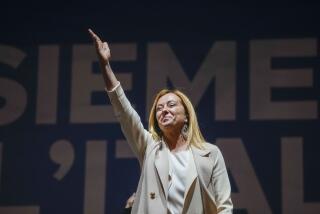Reform Is on Trial in Russian Election : Big extremist gains would be bad news for U.S.
- Share via
France’s Charles de Gaulle used to despair of trying to govern a country that “has 246 different kinds of cheese.” An observer of today’s Russia may similarly wonder how a country with 262 registered political parties can ever achieve the consensus that democratic government depends on.
On Sunday, Russian voters will pick from this vast political menu, which has been reduced and combined into a slightly more manageable 43 political blocs competing for 450 seats in the State Duma, the lower house of parliament. Six or eight of these blocs are expected to win representation. The biggest vote will probably go to the reborn Communist Party of the Russian Federation, which has made itself the voice of public discontent with all that has happened over the last half-dozen years.
Other antireform movements could also do well, notably Vladimir Zhirinovsky’s wildly misnamed Liberal Democratic Party, which is built on xenophobic chauvinism directed especially against Jews and non-Russians from the Caucasus and Central Asia. Like fascist movements elsewhere, Zhirinovsky’s party finds support among the unemployed, the unskilled and the armed forces.
The Communists’ strongest appeal is to older voters who--because of inflation that has eroded savings and pensions and because of their nostalgia for a more self-confident Russia--despise the reforms of the post-Communist period.
The centrist and other democratic parties, identified largely with private property rights, free market economics and a nonexpansionist Russia, lack the appeal to tradition and discontent that the parties of the far left and right can make. The big question is whether they and other nonextreme parties winning seats in the Duma can work together to control the radicals.
If the bad news about the Russian election is that the extremist blocs bode to do well, the good news is that under the existing constitution most power rests with the president, with the Duma having little more than a nominal role in policy. What President Boris N. Yeltsin’s parliamentary opponents can do--as they have shown--is force him to slow down reform and adopt more nationalistic policies.
A strong showing by the far left and right on Sunday could make the political interval between now and next June, when presidential elections are scheduled, especially disruptive. Some U.S. experts on Russia are convinced that reforms have gone too far to be reversed. But that doesn’t guarantee that renewed strains in relations between Russia and the United States won’t develop if Russian voters endorse extremist views. Right now, in a worrying turn for Russia’s democratic prospects, that seems to be the unhappy likelihood.
More to Read
Sign up for Essential California
The most important California stories and recommendations in your inbox every morning.
You may occasionally receive promotional content from the Los Angeles Times.













